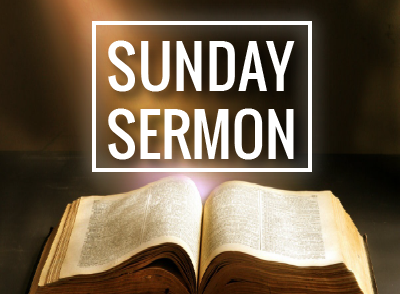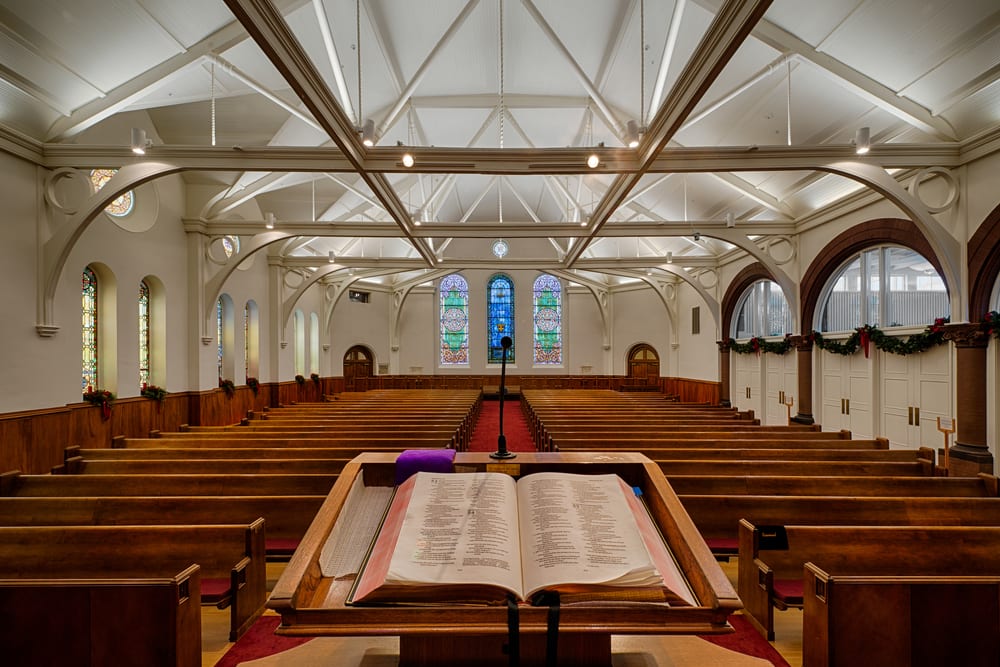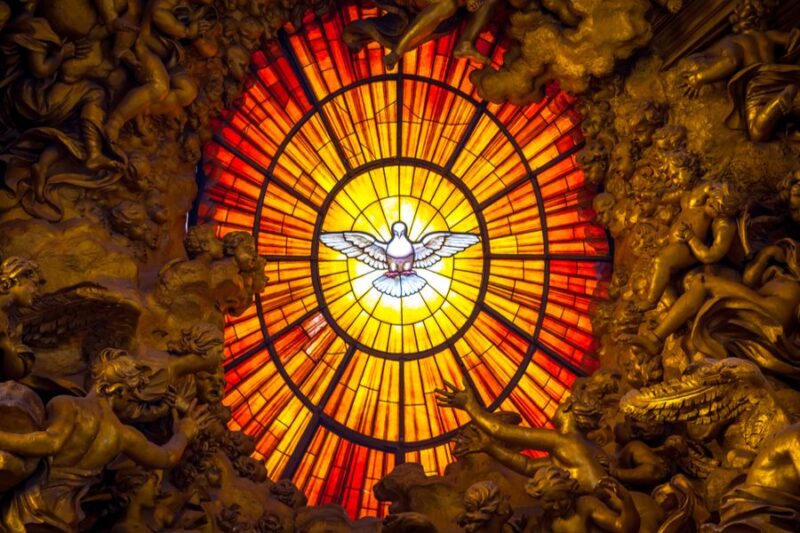Let love be genuine; hate what is evil, hold fast to what is good, love one another with mutual affection… serve the Lord.” Romans 12:9-11
Let us pray:
Throw open every window and every door by which your word might reach us, God. Open our hearts and our minds and our spirits to whatever you might have to say to us today. Amen.
Sitting in one place for days on end gives one a lot of time to think about different topics. One can let one’s mind drift into other places and times and wonder what this or that would be like if only this or that was different. One plays the what-if game. How different would my or your life be if we had done this, gone that way rather than the way we went, and all the rest? It is okay to dream if we eventually come back to reality.
This morning, we heard a passage from Paul’s letter to the Romans. Believed to have been written in late 55 to early 57 CE, this letter seeks to reconcile the Jewish and Gentile Christian communities in Rome. Paul writes in such a way that he has something for all sides yet points them back to this idea that we are all one in Christ Jesus.
Paul begins where I usually start, with love. As I have mentioned, love is central to the life of the Christian. But Paul goes a little bit deeper here, “Let your love be genuine.” Genuine is “truly what something is said to be; authentic.” This is emphatic: it either is or is not, and there is no in-between. If we say we love, we must mean what we say; we cannot just pay it lip service. It is easy to say I love this and that, but do we really?
Love is one of those words that we throw around too much and, in many ways, has lost its true meaning. You will recall that the Christian Scriptures were written in Greek and that there are at least five words for love in Greek. In English, we have one, so the word we use to declare our love for hamburgers is the same word to express our love for our spouse. The love Paul is writing about is brotherly love, “love one another with mutual affection.”
Another interesting point is that Paul is writing to the entire community in Rome, not just a particular group or an individual. Paul is writing about community and how we make community better. For Paul, the community is not just a group of people who come together once a week but rather a group of people who care for each other in such a profound way that we “outdo each other in showing honor.” We always honor and care for one another, not just when convenient.
Now, this is an ideal, something that we should strive for. Will we make it? Maybe not, but what is essential is that we try. Paul is writing about the here and now; Paul wants the community to reflect genuine love and affection, which will help build up the kingdom of God on earth, as it is in heaven. This is not an ideal that can only be realized “on the other side” but can very much exist here and now. If we believe it can.
In verse 14, Paul shifts gears a little. Until this time, Paul has been dealing with some esoteric ideals about community living, but verse 14 brings it home.
“Bless those who persecute you.” Wait, what did he say? Yes, he said that, and Paul reminds us, just in case we forgot, “Bless and do not curse them.” This is not a new idea; there was another guy who had a beard and rose from the dead, oh yeah, Jesus, who said the same thing, so Paul is not breaking new ground here, just reminding us of the command that Jesus left. What’s interesting is the choice of words Paul is using.
Jesus commanded we love one another. I will not go into great detail about the meaning of that; you can read any of the 100 or some sermons I have preached on that subject. Jesus says love, but Paul says bless. As I understand these things, the saying “bless his heart” can be taken multiple ways. It can be taken as a genuine form of concern or, as it is most often used, in a more sarcastic way. Now, I am not saying that if we bless something, we should do it halfheartedly, just the opposite. But a blessing is a little easier to take than love.
Another way of thinking about blessing someone you really cannot stand is asking God to come into this person’s life and help them see the error of their ways and place them back upon the path of righteousness. In this way, you are performing a service for them.
Then we come to verse 17, “Do not repay evil for evil, but take thought for what is noble in the sight of all.”
Raise your hand if you have ever been wronged or hurt by another person, just as I thought, most, if not all, of us. You don’t have to raise your hand on this one, but how many of you thought about getting even or mentioned karma coming around to help them along the way? It is natural to want the other to get what is coming.
Now, Paul says, “do not repay evil for evil.” Paul does not say we cannot seek justice. Paul is talking about not seeking vengeance because vengeance comes from a place of anger. Justice can also come from anger, but it is anger pointed in the right direction.
In my weekly email, I mentioned the hymn Onward Christian Soldiers and how the original meaning had been coopted for various reasons. I also mentioned that this hymn had become an anthem for the civil rights movement in the 1960s. The civil rights movement is a perfect example of love in action.
March 7, 1965, on the Edmund Pettus Bridge in Selma, Alabama, love came into direct contact with hate. On one side was a group of people fighting for equal rights for all, and not just some, and on the other was a group of people fighting to keep those same people, Americans, from having those same rights for no other reason than they looked different. On Bloody Sunday, love was met with clubs and guns, but evil was not returned, although many wanted it. A few weeks later, on March 21st, they were back, both sides, but this time, love won. It would be a long war, one we indeed still fighting, but the tide turned, and it was because of love.
We cannot love another and wish evil on them simultaneously. We can love them and hope that justice comes their way; we can actively work to see that justice does come their way, but we cannot wish evil on them. Listen, there are certain people I hope we all get to see in orange jumpsuits being led away in handcuffs, but I do not wish harm to come upon them.
I have encountered some tough people in ministry. Some might call them evil, but I hold to the idea that no person is evil; their actions might be evil and may have been corrupted by evil, but they are not evil.
There is one person I can think of who never had a good thing to say about anything. This person was miserable to be around and was only happy when others were miserable. At church meetings, this person would always cause problems. It was so bad that we delayed bringing things to meetings if they would be there to avoid the inevitable conflict. I was at my wit’s end and did not know what to do. I asked a colleague who had also dealt with this person what to do. The response was, “charm and disarm.” Meeting their hatred head-on with love throws them off their game.
“If you enemy is hungry, feed them; if thirsty, give them something to drink.” It is easy to get sucked into the vortex of hate. We saw what happened live on television on January 6, 2021, when people got all riled up and filled with hatred toward others. Hatred was on full display that day. Sure, there was some love in there as well, but it was hatred that broke the glass, it was hatred that beat the police officers to death, it was hatred that stormed the capitol that day. We want justice, and we will get it. Paul says, “do not become overcome by evil, but overcome evil with good.”
Never surrender…. to evil.
Paul knew that this was an ideal, something that we should strive for, and Paul also knew that we could not do it or even try to do it outside God’s grace. Removing grace, removing the idea that we have all been created in the image and likeness of God, leads us to believe that others are less than and deserve less than. It’s what leads others to put buoys with saw blades across rivers to keep others out. It is what leads to protests about equality, and it’s what leads one human being to hate another human being just because they are different.
So where does it all begin? It begins inside each of us, but it will not happen overnight. It’s okay to be angry and want change. It’s okay to fight for that change with every fiber of our being, but we must do it from a place of love, not hate. Turn that anger towards good, fight for what is right and what is just, not just for some but for all.
Look out for one another and offer gentle corrections when you see someone moving in an unloving direction. Yes, there will be people we can never love, which is fine; provide a blessing for that person, and pray that God helps you move in the direction of love. We might never get there, but we are moving towards it.
Friends, there is a lot to unpack in these verses. Take these verses with you and pray with them, meditate with them, argue with them, let them ruminate with you, struggle with them, and then, let’s discuss. How can we be more loving today, tomorrow, and the next day, and how can we bring God’s kingdom right here, now.
Amen.









